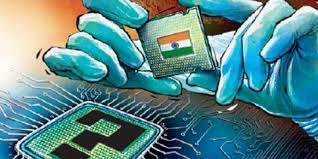At an event on Friday that was attended by Prime Minister Narendra Modi, the heads of some of the top semiconductor companies in the United States praised India's technology sector as the world's fifth-largest economy tries to establish itself as a worldwide chip powerhouse.
At SemiconIndia, Modi shared the stage with the CEOs of Micron and Cadence as well as senior executives from Applied Materials and AMD. They discussed their involvement in the Indian semiconductor sector. The CEO of the American industry group SEMI, Ajit Manocha, was also present.
“For the first time in India’s history, geopolitics, domestic policies and private sector capacity are aligned in India’s favor to become a player in semiconductor production,” Manocha said during a keynote speech.
“We will look back in the year 2023 … as a milestone year in which things began to take shape.”
The gathering featuring some of the largest chip companies in the world emphasises India's desire to compete with nations like the United States, Taiwan, and South Korea as a major semiconductor powerhouse.
India's chip strategy is divided into two main components. The first is to entice international businesses to establish operations and invest in the nation, and the second is to create alliances with other important semiconductor-producing countries like the United States.
The semiconductor industry now gets supporting policy from New Delhi. The government approved a $10 billion incentive programme for the semiconductor sector in December. Also eligible are overseas businesses.
And during his visit to the United States last month, Modi pledged to cooperate with the United States on semiconductors and other issues. The American chip businesses present at SemiconIndia discussed their existing investments there and announced new ones, underscoring the country's emphasis on luring foreign corporations.
Over the next five years, AMD announced it will invest in India to the tune of $400 million. This includes a brand-new campus in Bangalore, which will serve as the business's principal design hub.
“India teams will be pivotal in advancing AI machine learning and both hardware and software capabilities,” Mark Papermaster, CTO of AMD, said during a keynote speech on Friday.
Micron revealed plans to build a semiconductor assembly and testing plant in Gujarat, India, last month. Up to $825 million will be invested by Micron.
“We are hopeful that this investment will help catalyze other investments in the sector, strengthen indigenous manufacturing capability, encourage innovation and support broader job creation,” Sanjay Mehrotra, CEO of Micron, said on Friday.
India’s IT minister Ashwini Vaishnaw said Friday that construction on this plant would start “soon.”
Young Liu, the chairman of Foxconn, the Taiwanese business that assembles Apple's iPhones, was another important attendee. Foxconn has pushed into semiconductors over the last few years.
The largest effort was made last year when Foxconn and Indian metals-to-oil behemoth Vedanta decided to form a $19.5 billion joint venture and build a semiconductor and display production facility in India. Foxconn, however, withdrew from the project this month, which hurt both the company's and India's aspirations.
However, it doesn't appear to have stopped either company. Liu's attendance at the event is a hint of Foxconn's desire to make an investment in India. Foxconn plans to invest $2 billion in India over the next five years, Liu said on Friday to CNBC-TV18.
Anil Agarwal, the chair of Vedanta Group, stated at SemiconIndia on Friday that the business has "identified world class partners for technology and are in the process of tying up with them" in the semiconductor industry.
Some of India's issues in the semiconductor business are hidden by the high-profile event with all the CEOs.
According to Pranay Kotasthane, deputy director of the Takshashila Institution, packaging and testing of semiconductors is one industry in which India may be competitive. India may have the comparatively unskilled labour force but large capital investment needed for this. However, no significant Taiwanese company in this market sector has opened an office in India.
“The lack of policy consistency and high import tariffs are the bottlenecks that can explain why Taiwanese companies haven’t moved ahead,” Kotasthane said.
Meanwhile, entrepreneurs looking to open businesses in India have had trouble finding appropriate technical partners in the field of foundries, the businesses that actually produce semiconductors. According to reports, STMicroelectronics, a European semiconductor company, provided the technology for the Vedanta and Foxconn partnership in chip manufacture.
“None of the fab proposals have yet been able to find good technology partners,” Kotasthane said.
Nevertheless, analysts have cited India's sizable domestic market as well as additional elements like incentives as causes for optimism for the nation's chip market.
Modi praised India's credentials on Friday.
“Skilled engineers and designers are our strength. Anyone who wants to be a part of the world’s most vibrant and unified market has faith in India,” the Indian prime minister said.
(Source:www.flipboard.com)
At SemiconIndia, Modi shared the stage with the CEOs of Micron and Cadence as well as senior executives from Applied Materials and AMD. They discussed their involvement in the Indian semiconductor sector. The CEO of the American industry group SEMI, Ajit Manocha, was also present.
“For the first time in India’s history, geopolitics, domestic policies and private sector capacity are aligned in India’s favor to become a player in semiconductor production,” Manocha said during a keynote speech.
“We will look back in the year 2023 … as a milestone year in which things began to take shape.”
The gathering featuring some of the largest chip companies in the world emphasises India's desire to compete with nations like the United States, Taiwan, and South Korea as a major semiconductor powerhouse.
India's chip strategy is divided into two main components. The first is to entice international businesses to establish operations and invest in the nation, and the second is to create alliances with other important semiconductor-producing countries like the United States.
The semiconductor industry now gets supporting policy from New Delhi. The government approved a $10 billion incentive programme for the semiconductor sector in December. Also eligible are overseas businesses.
And during his visit to the United States last month, Modi pledged to cooperate with the United States on semiconductors and other issues. The American chip businesses present at SemiconIndia discussed their existing investments there and announced new ones, underscoring the country's emphasis on luring foreign corporations.
Over the next five years, AMD announced it will invest in India to the tune of $400 million. This includes a brand-new campus in Bangalore, which will serve as the business's principal design hub.
“India teams will be pivotal in advancing AI machine learning and both hardware and software capabilities,” Mark Papermaster, CTO of AMD, said during a keynote speech on Friday.
Micron revealed plans to build a semiconductor assembly and testing plant in Gujarat, India, last month. Up to $825 million will be invested by Micron.
“We are hopeful that this investment will help catalyze other investments in the sector, strengthen indigenous manufacturing capability, encourage innovation and support broader job creation,” Sanjay Mehrotra, CEO of Micron, said on Friday.
India’s IT minister Ashwini Vaishnaw said Friday that construction on this plant would start “soon.”
Young Liu, the chairman of Foxconn, the Taiwanese business that assembles Apple's iPhones, was another important attendee. Foxconn has pushed into semiconductors over the last few years.
The largest effort was made last year when Foxconn and Indian metals-to-oil behemoth Vedanta decided to form a $19.5 billion joint venture and build a semiconductor and display production facility in India. Foxconn, however, withdrew from the project this month, which hurt both the company's and India's aspirations.
However, it doesn't appear to have stopped either company. Liu's attendance at the event is a hint of Foxconn's desire to make an investment in India. Foxconn plans to invest $2 billion in India over the next five years, Liu said on Friday to CNBC-TV18.
Anil Agarwal, the chair of Vedanta Group, stated at SemiconIndia on Friday that the business has "identified world class partners for technology and are in the process of tying up with them" in the semiconductor industry.
Some of India's issues in the semiconductor business are hidden by the high-profile event with all the CEOs.
According to Pranay Kotasthane, deputy director of the Takshashila Institution, packaging and testing of semiconductors is one industry in which India may be competitive. India may have the comparatively unskilled labour force but large capital investment needed for this. However, no significant Taiwanese company in this market sector has opened an office in India.
“The lack of policy consistency and high import tariffs are the bottlenecks that can explain why Taiwanese companies haven’t moved ahead,” Kotasthane said.
Meanwhile, entrepreneurs looking to open businesses in India have had trouble finding appropriate technical partners in the field of foundries, the businesses that actually produce semiconductors. According to reports, STMicroelectronics, a European semiconductor company, provided the technology for the Vedanta and Foxconn partnership in chip manufacture.
“None of the fab proposals have yet been able to find good technology partners,” Kotasthane said.
Nevertheless, analysts have cited India's sizable domestic market as well as additional elements like incentives as causes for optimism for the nation's chip market.
Modi praised India's credentials on Friday.
“Skilled engineers and designers are our strength. Anyone who wants to be a part of the world’s most vibrant and unified market has faith in India,” the Indian prime minister said.
(Source:www.flipboard.com)






